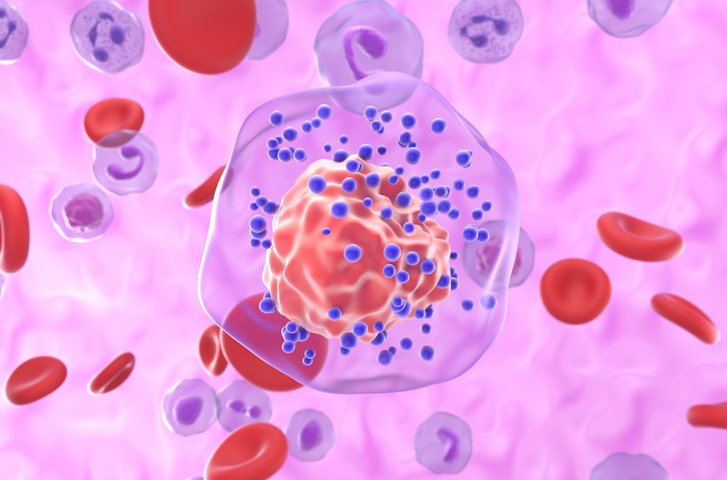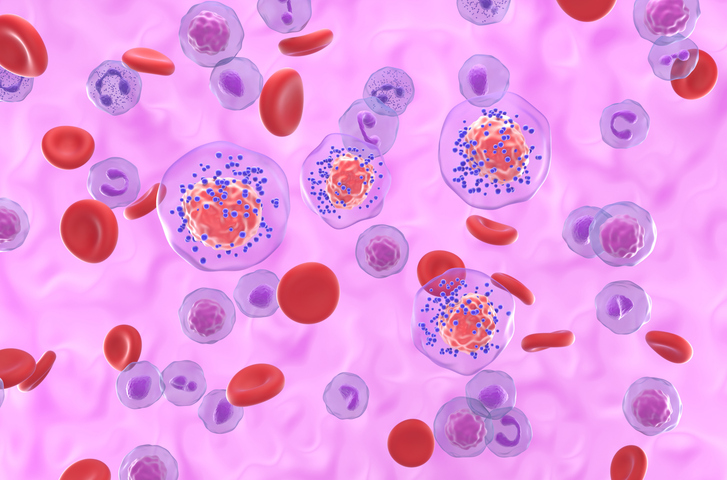
A combination of sacituzumab govitecan (Trodelvy) and pembrolizumab (Keytruda) has demonstrated a statistically significant and clinically meaningful improvement in progression-free survival (PFS) compared with standard-of-care chemotherapy plus pembrolizumab in patients with previously untreated PD-L1–positive metastatic triple-negative breast cancer (mTNBC), according to topline results from the phase III ASCENT-04/KEYNOTE-D19 trial.
The study, sponsored by Gilead Sciences in collaboration with Merck & Co, enrolled 443 patients with inoperable locally advanced or metastatic TNBC whose tumors expressed PD-L1 (combined positive score ≥10). The combination of sacituzumab govitecan and pembrolizumab is the first TROP-2–directed antibody-drug conjugate (ADC) plus immunotherapy regimen to demonstrate superiority over chemotherapy-based standard of care in the first-line mTNBC setting.
“These findings are the first to show the transformative potential of an antibody-drug conjugate combined with an immuno-oncology agent in early treatment lines of metastatic breast cancer,” said Dietmar Berger, MD, PhD, chief medical officer at Gilead Sciences.
The ASCENT-04 trial met its primary end point of PFS, as assessed by blinded independent central review, using Response Evaluation Criteria in Solid Tumors version 1.1 (RECIST v1.1). A key secondary end point, overall survival (OS), was not mature at the time of this analysis, but investigators reported an early trend toward improved OS in the sacituzumab govitecan + pembrolizumab arm. Further analyses are ongoing.
“For patients with metastatic triple-negative breast cancer, there is a critical need for more effective treatment options,” said lead investigator Sara Tolaney, MD, MPH, of Dana-Farber Cancer Institute. “These data suggest that the combination of sacituzumab govitecan-hziy and pembrolizumab may offer a new treatment approach—bringing together a potent antibody drug conjugate with immunotherapy to improve outcomes for patients.”
The safety profile of the combination was consistent with known profiles of both agents, and no new safety signals were observed.
ASCENT-04/KEYNOTE-D19 Study Design Highlights
In the ASCENT-04/KEYNOTE-D19 trial, 443 patients with previously untreated, inoperable locally advanced or metastatic PD-L1–positive (combined positive score ≥10) TNBC were randomized 1:1 to receive sacituzumab govitecan (10 mg/kg on days 1 and 8 of a 21-day cycle) plus pembrolizumab (200 mg on day 1) or pembrolizumab with chemotherapy (gemcitabine/carboplatin, paclitaxel, or nab-paclitaxel). Treatment continued until disease progression or unacceptable toxicity occurred, and patients in the chemotherapy arm were allowed to cross over to the sacituzumab govitecan arm on progression of disease.
The primary end point was PFS as determined by blinded independent central review using RECIST v1.1 criteria. Secondary end points included overall survival, objective response rate, duration of response, time to response, patient-reported outcomes, and safety. The combination was well tolerated, with no new safety signals reported.
Reference
Trodelvy plus Keytruda demonstrates a statistically significant and clinically meaningful improvement in progression free survival in patients with previously untreated PD-L1+ metastatic triple-negative breast cancer. News release. Gilead. April 21, 2025. Accessed April 21, 2025.







 © 2025 Mashup Media, LLC, a Formedics Property. All Rights Reserved.
© 2025 Mashup Media, LLC, a Formedics Property. All Rights Reserved.